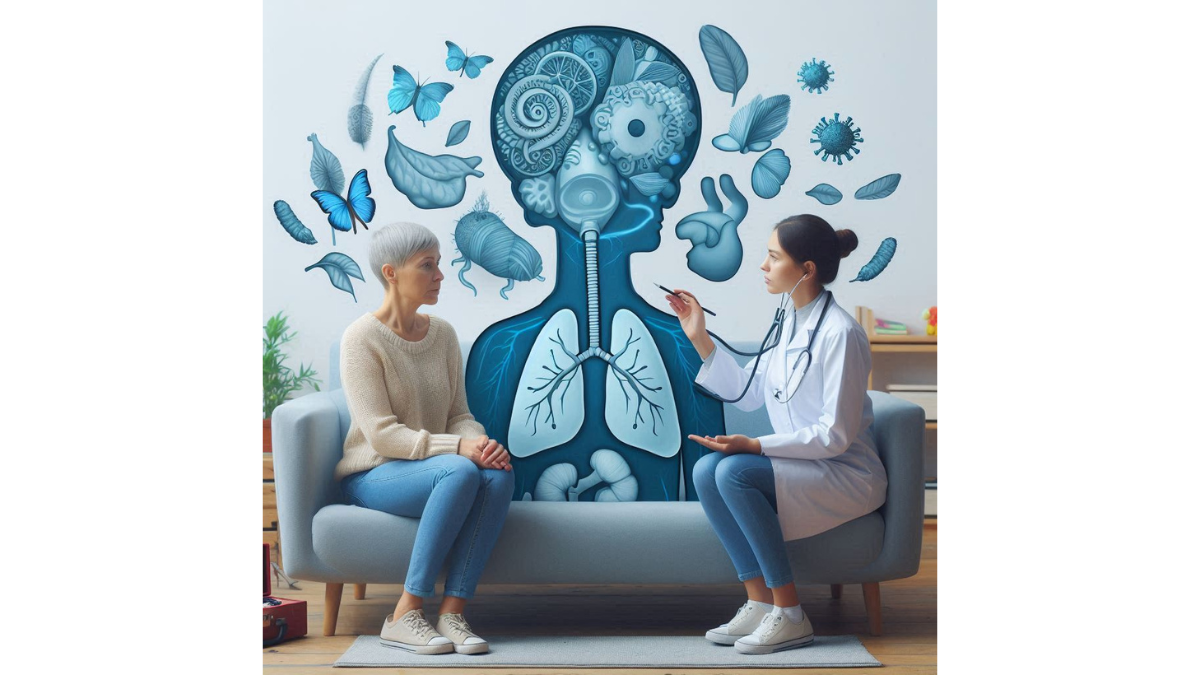psychological support for lung cancer patients

psychological support for lung cancer patients – Lung cancer is one of the most prevalent forms of cancer worldwide, and its profound impact on patients goes beyond the physical symptoms. Whether diagnosed with small cell lung cancer (SCLC) or non-small cell lung cancer (NSCLC), individuals often face a storm of emotions and uncertainties. Statistics reveal that lung cancer accounts for approximately 25% of all cancer deaths, making it a significant health challenge. It can be a game-changer in terms of one’s lifestyle, affecting everything from daily routines to long-term plans. Imagine receiving that life-altering diagnosis. The fear of the unknown, the changes in personal health, and the implications for family and work all converge to create a heavy emotional burden. You might feel isolated, wondering how to cope with a condition that not only threatens your physical health but also your overall well-being.
Importance of Psychological Support
Amid the maze of treatments and medical jargon, a crucial aspect often overlooked is the need for psychological support for lung cancer patients. Why is this so vital? Let’s break it down:
- Navigating Emotions: Processing the rollercoaster of emotions that comes with a lung cancer diagnosis can be daunting. Anxiety, anger, and sadness often intermingle, making it challenging to focus on healing.
- Enhancing Resilience: Psychological support fosters resilience. Understanding that you’re not alone in this journey can empower you to tackle the challenges more effectively.
- Coping with Treatment Side Effects: Treatments can lead to fatigue, nausea, and other side effects that impact mental health. Support can provide coping mechanisms to deal with these changes.
Studies indicate that patients who receive psychological support not only report better emotional well-being but also tend to adhere more closely to their treatment plans. It’s like having an anchor—someone to lean on during the stormy seas of treatment and recovery. As we explore the deep emotional impact of lung cancer in the following sections, remember that seeking psychological guidance isn’t a sign of weakness. It’s a courageous step towards regaining control over your health and life. Your well-being matters, and taking proactive measures can pave the way for a more hopeful journey.
Emotional Impact of Lung Cancer
Anxiety and Fear
Building on the theme of psychological support, it’s essential to delve into the emotional impact of lung cancer. One of the most predominant feelings you might experience is anxiety. The word “cancer” itself often carries a stigma and evokes fear of the unknown. Questions may swirl in your mind: “What will happen to me?” “How will this affect my loved ones?” This anxiety can manifest in various ways:
- Panic Attacks: Sudden surges of intense fear may lead to panic attacks, making everyday tasks feel overwhelming.
- Sleep Disturbances: The constant worrying can rob you of restful sleep, leaving you fatigued and even more susceptible to emotional distress.
- Avoidance Behavior: Some individuals may withdraw from social interactions, fearing judgment or not knowing how to explain their diagnosis.
It’s natural to feel this way, but acknowledging these emotions is the first step in managing them effectively. Remembering that you’re not alone and that support is available can significantly alleviate these feelings.
Depression and Isolation
Alongside anxiety, depression often rears its head during the lung cancer journey. The diagnosis can lead to a sense of isolation, both physically and emotionally. Many patients report feelings of hopelessness, and it’s easy to question the future:
- Reduced Interest in Activities: Hobbies and social gatherings may seem less appealing, leading to a cycle of withdrawal and loneliness.
- Feelings of Guilt or Worthlessness: You might feel like a burden to your loved ones, which can exacerbate depressive symptoms.
It’s important to recognize that these feelings are common among lung cancer patients. A friend once shared how debilitating her feelings of isolation became after her diagnosis. “I felt like I was living in a bubble. Everyone else was going on with their lives, while I was stuck in limbo,” she confided. The good news is that both anxiety and depression can be managed with the right psychological support. Engaging in therapy, reaching out to support groups, and discussing these feelings with healthcare professionals can provide relief, creating a safe space for you to express your emotions and begin to heal. As we continue exploring the benefits of psychological support, remember that it’s okay to reach out—acknowledging these feelings is the first step toward regaining control over your emotional health.
Benefits of Psychological Support
Coping Strategies
As you navigate the emotional rollercoaster of a lung cancer diagnosis, engaging in psychological support can be an invaluable resource. One of the most significant benefits is the development of effective coping strategies. These strategies are essential for managing the challenges you face, and they can greatly influence your overall emotional health. Some coping strategies you might discover through psychological support include:
- Cognitive Behavioral Techniques: These techniques help reframe negative thoughts into more positive or realistic ones. For example, instead of thinking “I’m a burden,” you can acknowledge, “I need support just like everyone does.”
- Stress Management Techniques: Activities such as deep breathing, meditation, or yoga can minimize anxiety and help you regain a sense of control.
- Journaling: Expressing your thoughts and feelings on paper can serve as a therapeutic outlet, allowing you to process emotions and track your progress.
A friend shared her experience with journaling, stating, “Writing down my feelings made them seem less daunting. It was like unloading my worries onto the page instead of carrying them inside.”
Improved Quality of Life
Beyond managing anxiety and depression, psychological support often leads to an overall improved quality of life. When you feel heard and understood, it enhances your ability to cope with treatments and daily challenges. Here’s how psychological support can elevate your life post-diagnosis:
- Stronger Relationships: Open communication nurtured by psychological support can enhance your relationships with family and friends. Sharing your journey can foster understanding and connection.
- Greater Resilience: By building coping mechanisms and emotional strength, you’ll likely feel more equipped to face challenges, whether related to treatment side effects or everyday stressors.
- Enhanced Self-Esteem: As you learn new coping strategies and receive support, you may gradually regain confidence. Many patients report that a positive mindset enhances their outlook on survival.
In sum, embracing psychological support is not merely about addressing negative feelings; it’s about equipping yourself with tools that can transform your experience. The journey through lung cancer is undeniably tough, but with the right support system and coping strategies, you can carve out a path toward a more fulfilling quality of life. As we continue to explore the types of psychological support available, remember that taking this step is a sign of strength, not weakness. You deserve to feel whole and empowered throughout your journey.
Types of Psychological Support
Individual Counseling
As you consider the immense benefits of psychological support, it’s crucial to understand the various types available. One prominent option is individual counseling, which provides a personalized space for you to explore your thoughts and emotions. In individual counseling, you have the opportunity to work one-on-one with a trained therapist who specializes in cancer care. This personalized approach allows you to:
- Tailor the Discussion: Focus on specific issues that are most concerning to you, whether that’s anxiety about treatment or fears about the future.
- Explore Coping Mechanisms: A therapist can guide you in developing coping strategies that resonate with your unique circumstances and personality.
- Process the Diagnosis: An individual session creates a safe haven to express your feelings, helping you to process the diagnosis and its implications fully.
For example, a lung cancer survivor shared, “Talking to someone who understood my struggle made all the difference. I felt seen and heard, which helped me manage my anxiety during treatment.” Individual counseling can be a powerful lifeline, as it fosters an environment of trust and empathy.
Group Therapy
Equally impactful is group therapy, which offers a different, yet valuable, dimension of psychological support. In group therapy, you join a small community of fellow patients grappling with similar challenges. This shared experience can create a strong sense of belonging and understanding. The benefits of group therapy include:
- Shared Experience: Engaging with others facing similar battles can alleviate feelings of isolation. You’re reminded that you’re not alone on this journey.
- Diverse Perspectives: Hearing different coping strategies and strategies from fellow participants can provide new insights and methods for managing your situation.
- Emotional Validation: Sharing stories and collectively expressing fears and joys can be therapeutic. It reinforces that it’s okay to feel the way you do.
A participant reflected, “Group therapy was my refuge. Hearing everyone’s stories made me realize we’re all in this together, and it reduced my fear of treatment.” Both individual counseling and group therapy offer unique pathways to emotional healing in the face of lung cancer. Whether you prefer the intimacy of one-on-one conversations or the connection found in a support group, each method provides valuable tools for navigating your emotional landscape. As you continue on your journey, exploring these types of psychological support can empower you to find what resonates best with you.
Importance of Support Systems
Family and Friends
Moving forward in your journey, it’s essential to recognize the pivotal role that support systems play in your emotional and psychological well-being. At the core of these systems are your family and friends. Their support can be a cornerstone in navigating the complexities of a lung cancer diagnosis. Family and friends often provide:
- Emotional Support: Their presence can help alleviate feelings of loneliness and fear. Just knowing that someone is there to listen can be a great comfort.
- Practical Assistance: Whether it’s accompanying you to medical appointments or helping with household chores, practical support can ease the burden during challenging times.
- Encouragement and Motivation: Loved ones can serve as cheerleaders, reminding you of your strength and capabilities, especially when you may doubt yourself.
For instance, a woman shared how her sister became her main support: “Whenever I felt overwhelmed, she would sit with me and just let me talk. Her simple gestures made the journey less daunting.” This highlights how connection and understanding from family and friends can make a significant difference.
Healthcare Professionals
In addition to familial support, healthcare professionals also form a critical part of your support system. These experts are not just there for the medical side of your cancer journey; they play a vital role in your overall well-being. Key contributions of healthcare professionals include:
- Expert Guidance: They provide insights and information about your condition, treatment options, and possible side effects, enabling you to make informed decisions.
- Emotional Support: Many healthcare professionals are trained to recognize the emotional impacts of cancer. They can recommend counseling or support groups to help you navigate feelings of anxiety and depression.
- Coordinated Care: Nurses, social workers, and oncologists often collaborate to ensure you receive comprehensive support throughout your treatment process.
One patient noted, “My nurse didn’t just check my vitals; she took the time to ask how I was feeling emotionally. That simple question made me feel valued and cared for.” In conclusion, the importance of a robust support system cannot be overstated in your journey with lung cancer. Both family and friends, as well as healthcare professionals, play integral roles in uplifting your spirits and guiding you through the challenges ahead. Recognizing and embracing these support structures can empower you to face the road ahead with strength and resilience.
Strategies for Providing Support
Active Listening
As we navigate the complexities of lung cancer, providing effective support to those affected is crucial. One of the most impactful strategies for offering support is active listening. This means fully engaging with the person, not just hearing their words but truly understanding their feelings and experiences. Active listening involves:
- Giving Full Attention: Put away distractions, make eye contact, and focus entirely on the conversation. This signals that you genuinely care about what they have to say.
- Reflecting Back: After they speak, paraphrase their words to show understanding. For instance, you might say, “It sounds like you’re feeling overwhelmed with everything going on.” This helps validate their emotions.
- Asking Open-Ended Questions: Encourage deeper conversations by asking questions that cannot be answered with a simple “yes” or “no.” This opens the door for more meaningful discussions, such as, “How are you coping with your treatment?”
A friend once recounted her experience, saying, “When my brother listened without judgment or interruption, I felt more comfortable sharing my fears. I realized he genuinely wanted to understand what I was going through.” Active listening not only strengthens relationships but also fosters trust and emotional connection.
Empathy and Compassion
In addition to listening, demonstrating empathy and compassion is paramount in supporting someone with lung cancer. Empathy allows you to put yourself in their shoes, truly feeling their struggles and emotions. Key elements of empathy and compassion include:
- Recognizing Emotional Needs: Be attentive to their feelings and understand that sorrow, anger, and fear are common responses to a cancer diagnosis.
- Offering Comforting Words: Sometimes, just saying, “I’m here for you” or “It’s okay to feel this way” can provide immense comfort. A gentle reminder that they are not alone can be incredibly reassuring.
- Being Patient: Understand that each person’s journey is unique. They may have good days and bad days. Your consistent support, regardless of their mood, can provide a sense of stability.
One caregiver shared, “I learned that sometimes it’s not about fixing things but simply being there for my loved one. Just holding their hand during treatment made a difference.” In essence, employing strategies like active listening and demonstrating empathy and compassion can transform the way you support someone battling lung cancer. These approaches not only enhance their emotional resilience but also strengthen the bonds of love and support that are vital during this challenging journey. In the next sections, we will explore coping with treatment side effects and other self-care strategies that further promote emotional health.
Coping with Treatment Side Effects
Managing Physical Symptoms
As we move along this journey, it’s vital to address the physical side effects of lung cancer treatment head-on. Treatments such as chemotherapy and radiation can bring about various symptoms that may impact your day-to-day life. Managing these symptoms effectively can significantly improve your quality of life. Here are some strategies to help manage physical symptoms:
- Stay Hydrated: Drinking plenty of fluids can combat fatigue and help flush out toxins. Herbal teas and electrolyte-rich beverages can be particularly beneficial.
- Nutritional Modifications: Eating a balanced diet rich in fruits, vegetables, and whole grains can sustain your energy levels. Some patients find that smaller, more frequent meals are easier to manage than three large ones.
- Gentle Exercise: Activities like walking or yoga can help reduce fatigue and muscle stiffness. Even short sessions of movement can uplift your mood.
- Complementary Therapies: Consider discussing options like acupuncture or massage therapy with your healthcare provider. Many patients find relief through these alternative treatments.
A fellow patient shared, “After starting light yoga in the mornings, I felt more energized and less burdened by fatigue. It made a huge difference in my outlook.” Recognizing and actively managing physical symptoms will enable you to reclaim some control over your well-being as you undergo treatment.
Addressing Emotional Challenges
In addition to physical challenges, emotional hurdles can also arise from the rigors of treatment. The unpredictability of how your body will feel can lead to anxiety, frustration, or even sadness. Addressing these emotional challenges is just as crucial for your overall well-being. Consider these strategies:
- Mindfulness and Relaxation Techniques: Practices like meditation, deep breathing, or mindfulness can help you stay grounded and reduce stress. Even a few minutes a day can make a difference.
- Journaling: Writing about your feelings can provide an emotional release. Reflecting on your thoughts may help you clarify what’s troubling you and offer insights into your journey.
- Engaging in Hobbies: Participating in activities you love can serve as a powerful distraction, helping to combat negative emotions. Whether it’s painting, reading, or gardening, find what brings you joy.
- Seeking Professional Help: If emotional struggles feel overwhelming, don’t hesitate to consult a therapist who specializes in cancer-related issues.
One patient mentioned, “I began journaling during treatment, and it was a revelation. It helped me process my fears and celebrate even the smallest victories.” In summary, coping with treatment side effects involves a multifaceted approach. By managing your physical symptoms and addressing emotional challenges, you create a supportive environment for healing and growth. As you face these challenges, remember that you are not alone—there are resources and strategies available to help you through this journey. In the subsequent sections, we’ll discuss self-care tips that empower you further throughout your experience.
Self-Care Tips for Patients
Mindfulness and Relaxation Techniques
Continuing our journey toward better mental and emotional health, implementing self-care strategies can be incredibly beneficial for lung cancer patients. Mindfulness and relaxation techniques are powerful tools you can use to promote inner peace and reduce anxiety, especially during challenging treatment periods. Here are some effective mindfulness and relaxation techniques to incorporate into your daily routine:
- Deep Breathing Exercises: Taking a few moments to engage in deep breathing can quickly ground you. Try inhaling deeply through your nose for a count of four, holding it for four, and then exhaling slowly through your mouth for a count of six. Repeat this several times.
- Guided Imagery: Picture a safe and peaceful place in your mind. This might be a beach, a quiet forest, or even a cozy room. Visualizing this space can help you relax and escape negative thoughts.
- Mindfulness Meditation: Allocate 5-10 minutes daily to simply sit, breathe, and focus on the present moment. If your thoughts wander, gently bring them back to your breath.
- Gentle Stretching or Yoga: Incorporating gentle stretches or yoga can help ease tension and promote relaxation. A friend of mine found joy in yoga, saying, “It helped me reconnect with my body and let go of stress.”
Integrating these mindfulness practices into your routine can lead to deeper emotional resilience and greater relaxation.
Healthy Lifestyle Choices
In addition to mindfulness, making healthy lifestyle choices plays a significant role in supporting your physical and emotional health throughout your lung cancer journey. A balanced lifestyle can positively impact your treatment and recovery. Consider these healthy lifestyle choices:
- Balanced Nutrition: Focus on colorful, nutrient-dense foods that provide energy and support your immune system. Think leafy greens, antioxidant-rich berries, and lean proteins. Creating a weekly meal plan can help you stay on track.
- Regular Physical Activity: Aim for light to moderate exercise suited to your energy level. Even short, brisk walks can help improve your mood and reduce fatigue.
- Adequate Rest: Sleep plays a vital role in healing. Prioritize creating a restful sleep environment, free from distractions. Aim for 7–9 hours of sleep each night.
- Hydration: Staying adequately hydrated supports your body during treatment. Keep a water bottle handy, and consider herbal teas as a comforting alternative.
A fellow patient remarked, “When I started focusing on nutrition and exercise, I noticed I had more energy and a more positive outlook on my journey.” Emphasizing self-care through mindfulness techniques and healthy lifestyle choices empowers you to take charge of your well-being. As we continue exploring resources for additional support, remember that caring for yourself holistically is vital in navigating the complexities of lung cancer with strength and grace.
Resources for Additional Support
Support Groups
As you embark on your lung cancer journey, it’s crucial to remember that you don’t have to face it alone. One invaluable resource is support groups, which offer a safe space for sharing experiences, gaining insights, and finding camaraderie among fellow patients. These groups can significantly enhance your emotional well-being and provide a sense of community. In a support group, you’ll find:
- Shared Experiences: Interacting with others who understand your journey can foster a deep sense of belonging. You’re likely to hear stories that resonate with your own feelings and struggles.
- Practical Advice: Group members often share tips and strategies they’ve found helpful during treatment. This knowledge can empower you to make informed choices about your care.
- Emotional Encouragement: Knowing that others are navigating similar challenges can help alleviate feelings of isolation and fear. Many have reported feeling uplifted and understood after attending just one session.
For example, one participant in a lung cancer support group shared, “I walked in feeling so alone, but by the end, I had formed connections and felt a weight lifted knowing I wasn’t alone in this fight.” Finding a local support group or connecting with organizations that facilitate these gatherings can be a game-changer in your emotional journey.
Online Forums
In addition to in-person support groups, online forums provide another layer of connection and understanding. These virtual platforms allow you to engage with a broader community without the constraints of geographic location. Here are some benefits of online forums:
- Access Anytime, Anywhere: Online forums offer flexibility, allowing you to participate in discussions at your own pace and comfort, whether it’s from home or while you’re waiting for an appointment.
- Anonymity and Comfort: Some individuals feel more comfortable sharing their feelings and experiences online, where they can maintain their anonymity while seeking support.
- Diverse Perspectives: Engaging with individuals from various backgrounds can introduce you to different coping strategies and insights you may not have considered.
A woman shared her experience, saying, “I found solace in an online support forum. Reading others’ stories made me feel like I was part of something bigger, and I could ask questions without feeling judged.” Remember, whether you choose to join a local support group or engage in online forums, seeking additional resources is a vital aspect of your journey. Both options can provide encouragement, diverse perspectives, and the emotional support you need to navigate through challenges. As you take these steps toward connection and understanding, you’re building a strong foundation for your healing and resilience in the face of lung cancer.
Conclusion
Empowering Lung Cancer Patients
As we reach the end of our exploration into the emotional and practical aspects of coping with lung cancer, it’s important to reflect on the empowerment that comes from knowledge and support. Navigating this journey is undoubtedly challenging, but arming yourself with the right resources can provide strength and resilience. Empowerment for lung cancer patients is multifaceted:
- Educating Yourself: Understanding your diagnosis, treatment options, and potential side effects can give you a sense of control. Knowledge transforms fear into a proactive approach to your care.
- Building Support Networks: The importance of family, friends, and healthcare professionals cannot be overstated. Having a robust support system creates a safety net that can help catch you during tough times and lift you during moments of despair.
- Engaging in Self-Care: Prioritizing self-care practices like mindfulness and healthy lifestyle choices reinforces your ability to manage both physical and emotional challenges. Remember, it’s okay to prioritize your needs.
One patient remarked, “The more informed I became, the more empowered I felt. I started making choices and advocating for myself in ways I never thought possible.” This mindset shift can be transformative.
Continuing the Journey towards Healing
As you continue your journey toward healing, remember that it’s not a linear path. There will be ups and downs, victories and setbacks. Embrace every step, knowing you are taking control of your health and well-being. Key strategies for continuing this journey include:
- Stay Engaged: Whether it’s participating in support groups, online forums, or personal therapy, remain actively involved in your emotional health.
- Celebrate Small Wins: Every achievement matters, whether it’s completing a treatment cycle, maintaining a nutritious diet, or simply having a good day. Acknowledging these moments can lift your spirits.
- Seek Inspiration: Look for stories of resilience from other lung cancer survivors. Their journeys can offer hope and remind you of the strength within yourself.
In closing, your journey with lung cancer is uniquely yours, marked by moments of uncertainty and triumph. Armed with the right knowledge, support, and a commitment to self-care, you can transform this challenging experience into a story of empowerment and resilience. Keep moving forward, trusting that healing is a journey—one that you do not have to walk alone. Your strength, courage, and determination will guide you toward a brighter tomorrow.
You might also find this article helpful Happy Healthy and Whole : The Power of Positive Habits






5 Comments